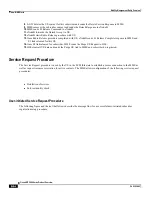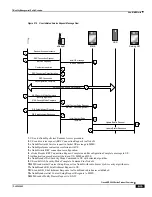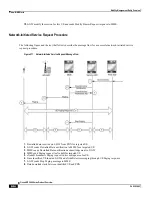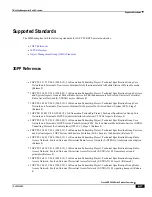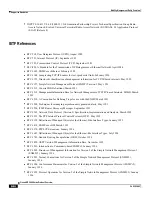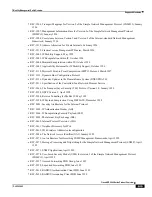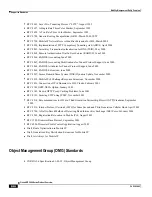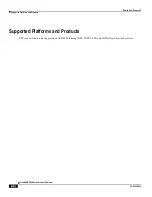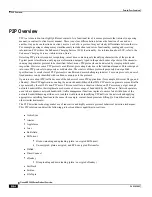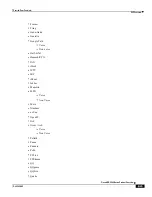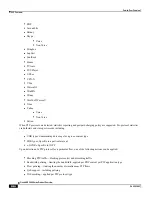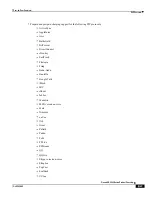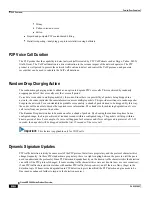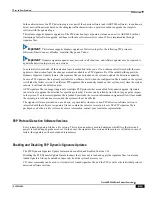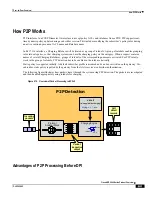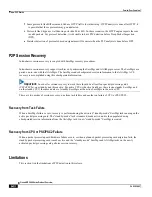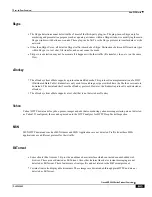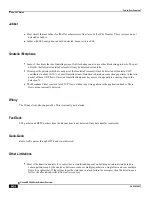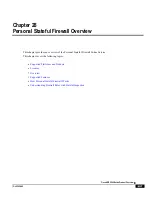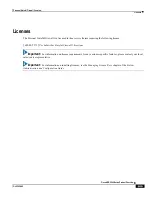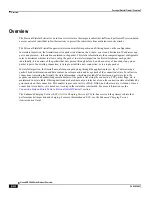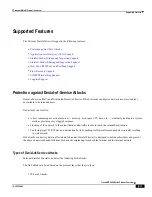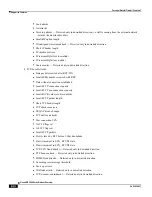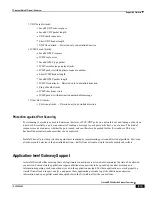
Peer-to-Peer Overview
▀ P2P Overview
▄ Cisco ASR 5000 Series Product Overview
OL-22938-02
Winny
Yahoo voice/non-voice
Zattoo
Prepaid and postpaid P2P content-based billing
Statistics reporting—analyzing per-protocol statistics using bulkstats
P2P Voice Call Duration
The P2P product has the capability to detect network traffic created by P2P VoIP clients such as Skype, Yahoo, MSN,
Gtalk, Oscar. The VoIP call duration is a direct indication to the revenue impact of the network operator. The P2P
product is well poised to process the network traffic online to detect and control the VoIP presence, and generate
records that can be used to calculate the VoIP call durations.
Random Drop Charging Action
The random drop charging action is added as an option to degrade P2P voice calls. This is achieved by randomly
dropping packets of the voice calls over the voice call period.
Voice data is encoded in multiple packets by the codec. Since there is a possibility of packets being dropped in a
network, the codec replicates the same information across multiple packets. This provides resilience to random packet
drops in the network. For a considerable degradable voice quality, a chunk of packets need to be dropped. By this way,
the codec will be unable to decode the required voice information. The chunk size for achieving degradation of voice
call varies from one protocol to another.
The Random Drop decision has to be made once for a chunk of packets. By choosing the random drop time from a
configured range, the drop is achieved at random seconds within a configured range. The packets will drop within a
known period of time. For example, if a voice call happens for 2 minutes and if we configure a drop interval of 12–15
seconds, then a packet will be dropped within the first 15 seconds of the voice call.
Important:
This feature is applicable only for VOIP calls.
Dynamic Signature Updates
P2P traffic detection is tricky because most of the P2P protocol details are proprietary, and the protocol characteristics
change frequently. As these P2P standards are proprietary, there is a tight coupling between the peers too (all the peers
need to understand the protocols). Since P2P detection depends heavily on the known traffic characteristics the detection
can suffer if the P2P protocol changes, if some existing traffic characteristics were not known (new use case scenarios),
if one P2P traffic characteristic matches with another P2P traffic (false positives), and if there are flaws (bugs) in the
detection logic. Whenever such degradation in P2P detection logic is identified, the P2P detection engine needs to be
fine tuned or enhanced further to improve the detection accuracy.
Summary of Contents for ASR 5000 Series
Page 1: ......
Page 26: ......
Page 48: ...New In Release 10 0 SCM Features Cisco ASR 5000 Series Product Overview OL 22938 02 ...
Page 50: ......
Page 58: ......
Page 68: ......
Page 126: ......
Page 138: ......
Page 146: ......
Page 218: ......
Page 236: ......
Page 356: ......
Page 374: ......
Page 422: ......
Page 496: ......
Page 572: ......
Page 654: ......
Page 700: ......
Page 726: ......
Page 784: ......
Page 816: ......
Page 844: ......
Page 906: ......
Page 926: ......
Page 942: ......
Page 943: ...Cisco ASR 5000 Series Product Overview OL 22938 02 Chapter 30 Technical Specifications ...
Page 966: ......
Page 972: ......

